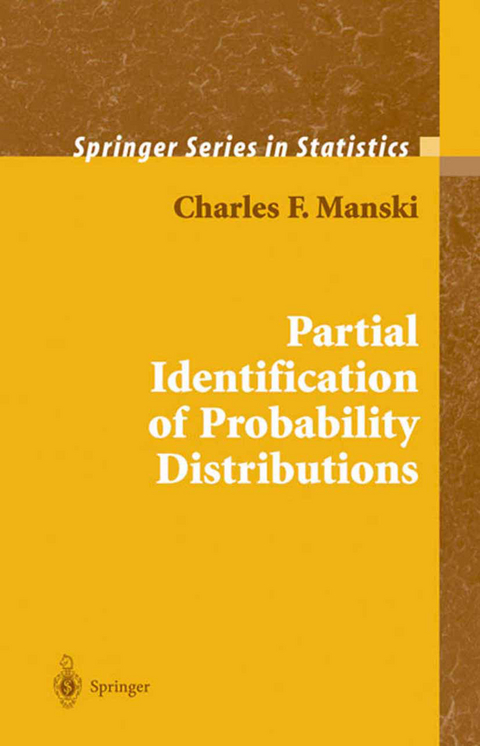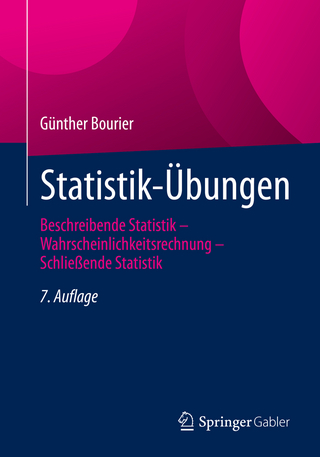
Partial Identification of Probability Distributions
Seiten
2011
|
Softcover reprint of the original 1st ed. 2003
Springer-Verlag New York Inc.
978-1-4419-1825-3 (ISBN)
Springer-Verlag New York Inc.
978-1-4419-1825-3 (ISBN)
Indeed, it has been commonplace to think of identification as a binary event – a parameter is either identified or not – and to view point identification as a precondition for inference.
Sample data alone never suffice to draw conclusions about populations. Inference always requires assumptions about the population and sampling process. Statistical theory has revealed much about how strength of assumptions affects the precision of point estimates, but has had much less to say about how it affects the identification of population parameters. Indeed, it has been commonplace to think of identification as a binary event – a parameter is either identified or not – and to view point identification as a precondition for inference. Yet there is enormous scope for fruitful inference using data and assumptions that partially identify population parameters. This book explains why and shows how. The book presents in a rigorous and thorough manner the main elements of Charles Manski's research on partial identification of probability distributions. One focus is prediction with missing outcome or covariate data. Another is decomposition of finite mixtures, with application to the analysis of contaminated sampling and ecological inference. A third major focus is the analysis of treatment response. Whatever the particular subject under study, the presentation follows a common path. The author first specifies the sampling process generating the available data and asks what may be learned about population parameters using the empirical evidence alone. He then ask how the (typically) setvalued identification regions for these parameters shrink if various assumptions are imposed. The approach to inference that runs throughout the book is deliberately conservative and thoroughly nonparametric.
Sample data alone never suffice to draw conclusions about populations. Inference always requires assumptions about the population and sampling process. Statistical theory has revealed much about how strength of assumptions affects the precision of point estimates, but has had much less to say about how it affects the identification of population parameters. Indeed, it has been commonplace to think of identification as a binary event – a parameter is either identified or not – and to view point identification as a precondition for inference. Yet there is enormous scope for fruitful inference using data and assumptions that partially identify population parameters. This book explains why and shows how. The book presents in a rigorous and thorough manner the main elements of Charles Manski's research on partial identification of probability distributions. One focus is prediction with missing outcome or covariate data. Another is decomposition of finite mixtures, with application to the analysis of contaminated sampling and ecological inference. A third major focus is the analysis of treatment response. Whatever the particular subject under study, the presentation follows a common path. The author first specifies the sampling process generating the available data and asks what may be learned about population parameters using the empirical evidence alone. He then ask how the (typically) setvalued identification regions for these parameters shrink if various assumptions are imposed. The approach to inference that runs throughout the book is deliberately conservative and thoroughly nonparametric.
Charles F. Manski is Board of Trustees Professor at Northwestern University. He is author of Identification Problems in the Social Sciences and Analog Estimation Methods in Econometrics. He is a Fellow of the American Academy of Arts and Sciences, the American Association for the Advancement of Science, and the Econometric Society.
Introduction: Partial Identification and Credible Inference.- Missing Outcomes.- Instrumental Variables.- Conditional Prediction with Missing Data.- Contaminated Outcomes.- Regressions, Short and Long.- Response-Based Sampling.- Analysis of Treatment Response.- Mnotone Treatment Response.- Monotone Instrumental Variables.- The Mixing Problem.
| Reihe/Serie | Springer Series in Statistics |
|---|---|
| Zusatzinfo | 1 Illustrations, black and white; XII, 179 p. 1 illus. |
| Verlagsort | New York, NY |
| Sprache | englisch |
| Maße | 155 x 235 mm |
| Themenwelt | Mathematik / Informatik ► Mathematik ► Finanz- / Wirtschaftsmathematik |
| Mathematik / Informatik ► Mathematik ► Wahrscheinlichkeit / Kombinatorik | |
| Sozialwissenschaften ► Soziologie ► Empirische Sozialforschung | |
| Wirtschaft ► Volkswirtschaftslehre ► Ökonometrie | |
| ISBN-10 | 1-4419-1825-6 / 1441918256 |
| ISBN-13 | 978-1-4419-1825-3 / 9781441918253 |
| Zustand | Neuware |
| Haben Sie eine Frage zum Produkt? |
Mehr entdecken
aus dem Bereich
aus dem Bereich
Beschreibende Statistik – Wahrscheinlichkeitsrechnung – Schließende …
Buch | Softcover (2022)
Springer Gabler (Verlag)
32,99 €


